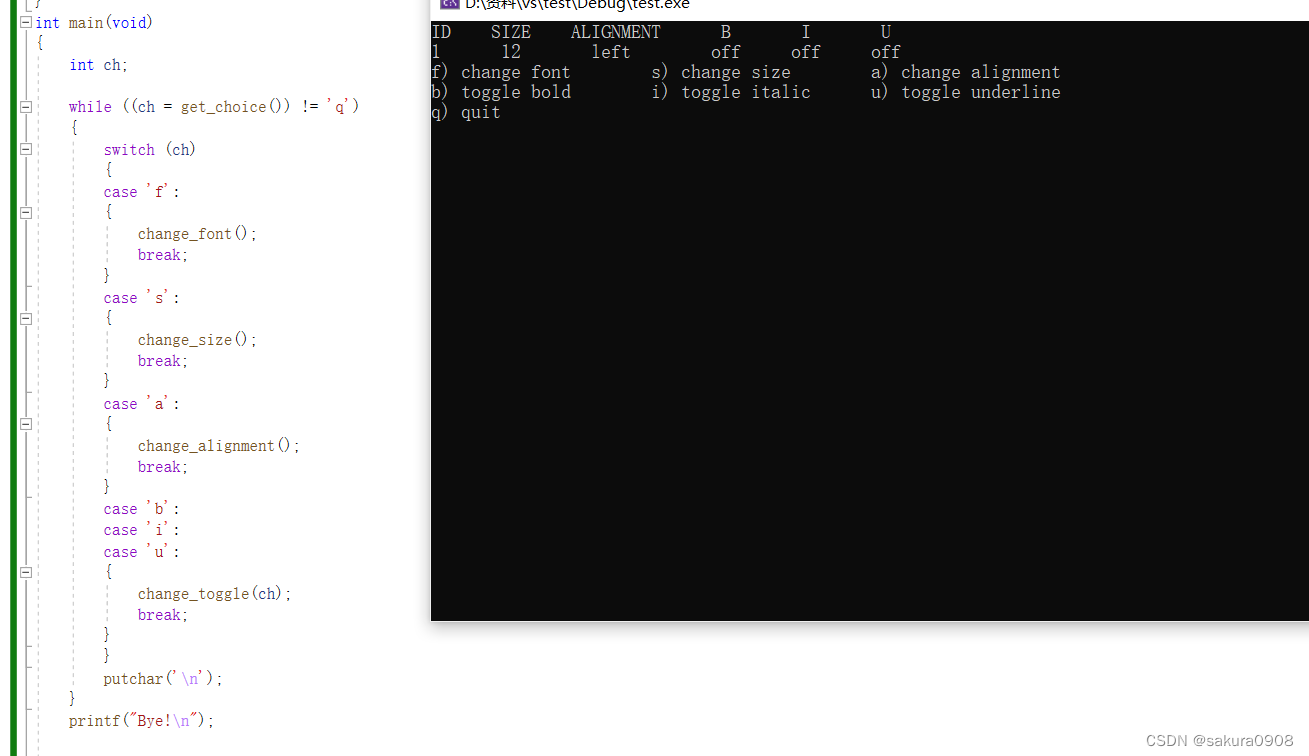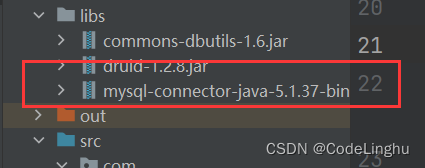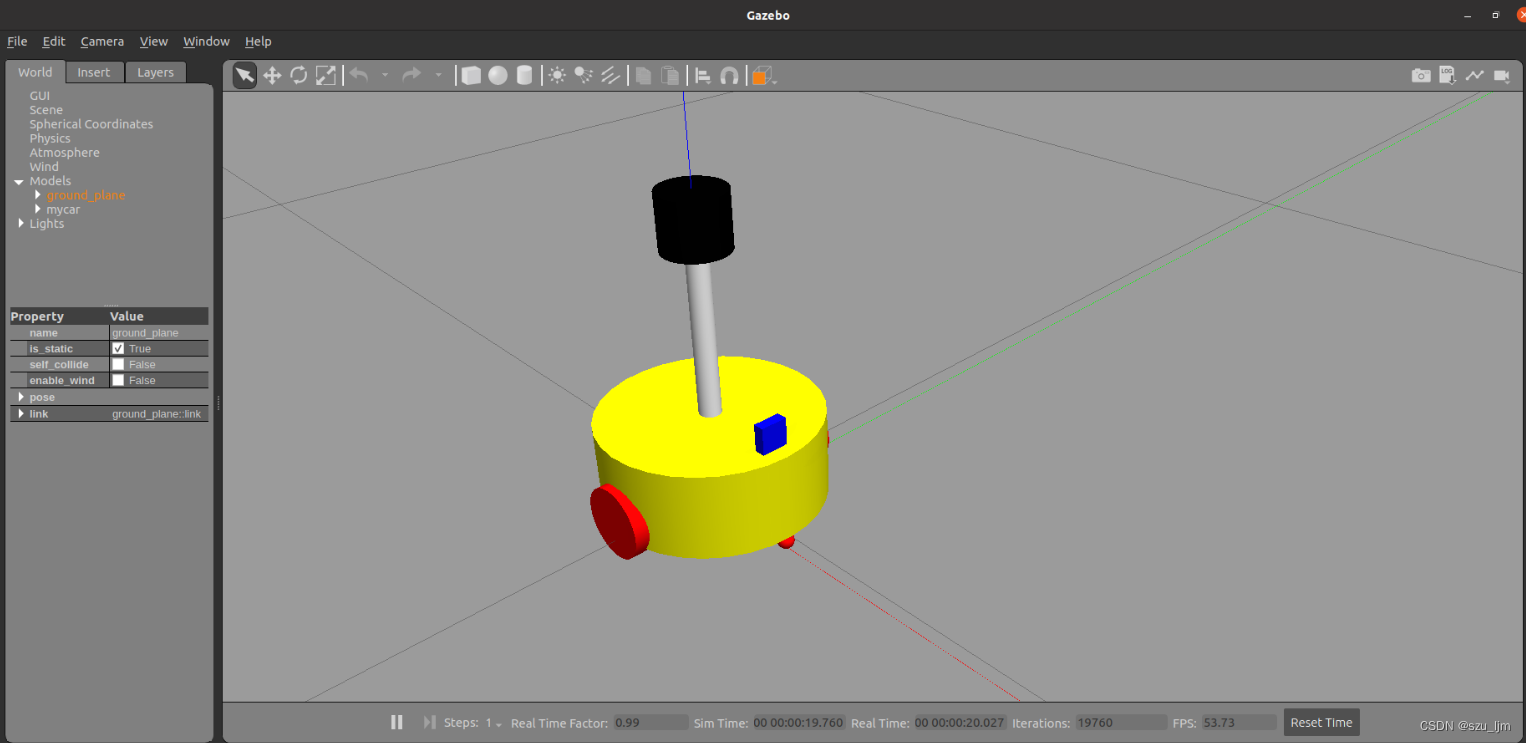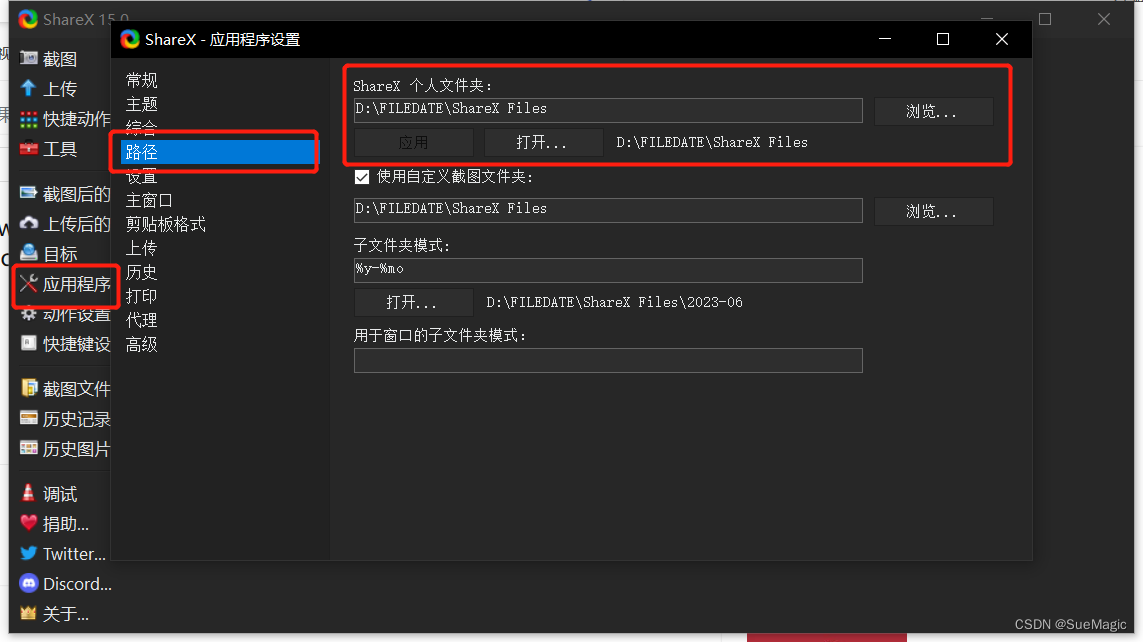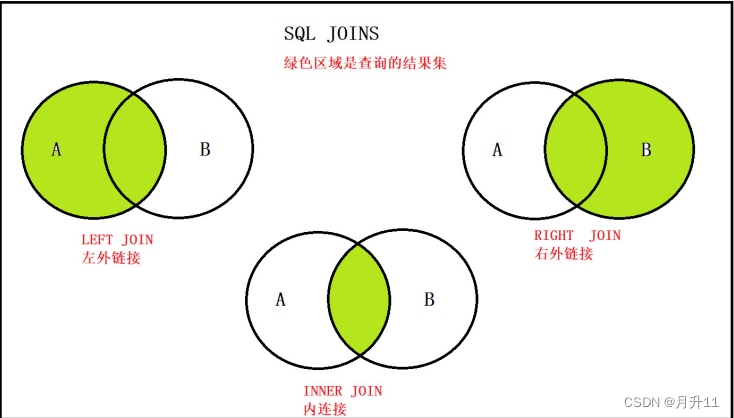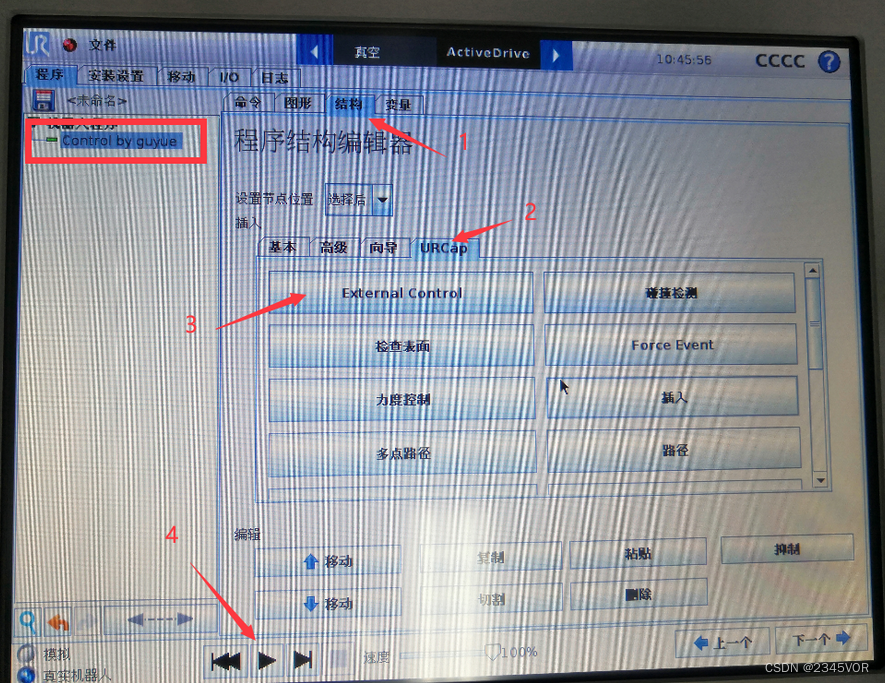SSLpinnig
- 前言
- 一、起步
- 二、抓包
- 三、分析
- 四、验证
- 第一种方法:
- 第二种方法:
- 借鉴
前言
这题在抓包方面会有点小问题,但是最后结果是正确出来了,如果有了解后面这个问题的读者,请多指教,十分感谢。
一、起步
先打开APP,打开第五题,可以发现是一个双向认证的题目。
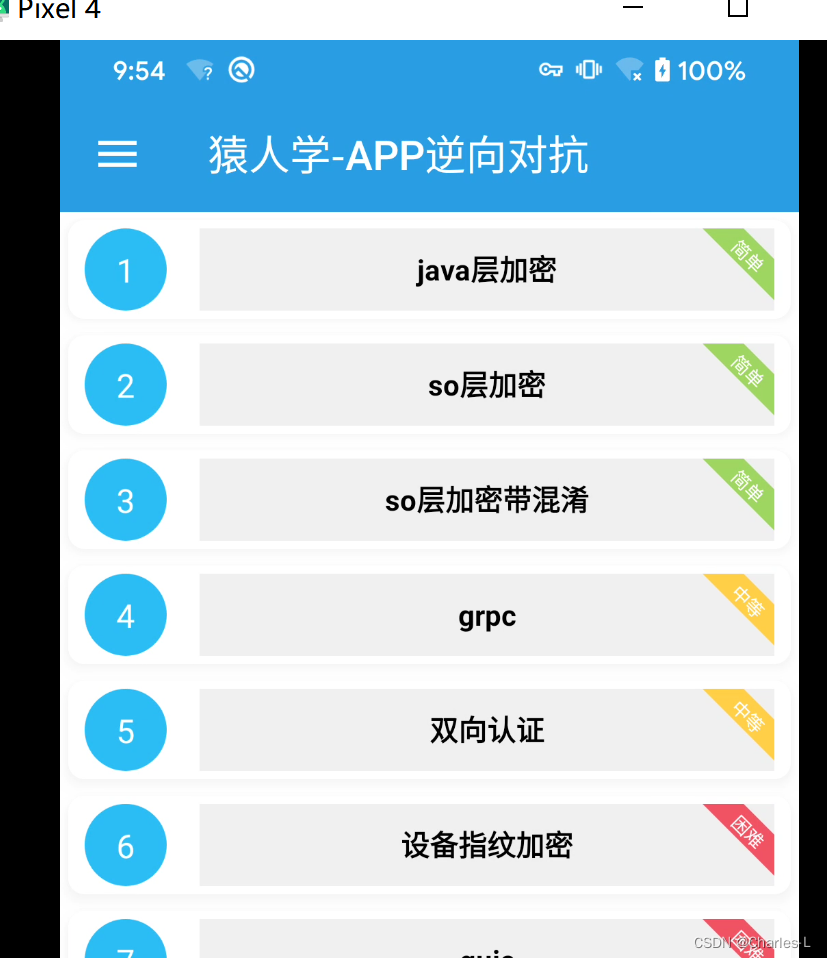
二、抓包
打开代理工具抓包设置一下于Charles的端口,我这里使用的代理工具是Brook。
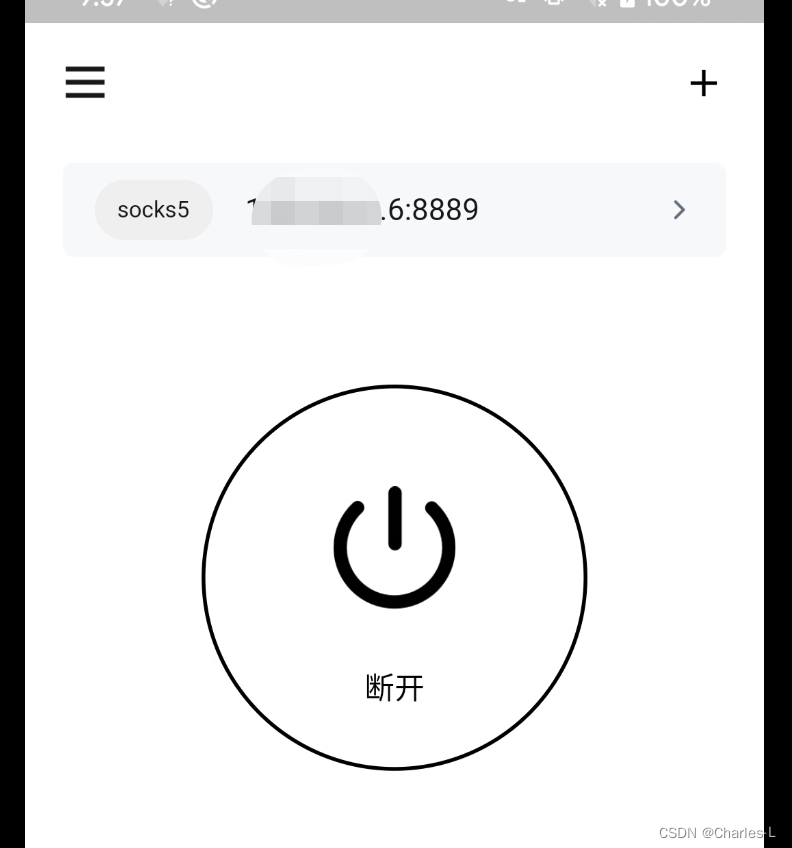
代理打开后,访问第五题,会发现一直转不出来结果。
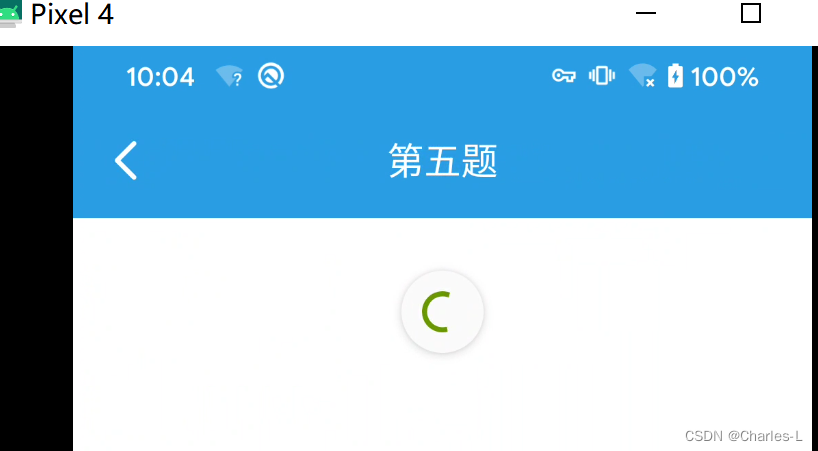
并且Charles会显示访问失败的信息

三、分析
从错误信息可以看到这个是跟SSL相关的请求,首先就排除了VPN检测这个问题。接下来就可以启动一下Client校验Server的frida脚本看看是否能够继续访问。(这句话其实是正常逆向要走的一个步骤,但是在本题已经很明确了是双向校验,所以其实可以提前确认这个是走不通的,但是为了有个正常流程还是形式走一下)。
DroidSSLUnpinning.js这份代码是从猿人学课程得到的,可以直接拿去使用,在没有特殊情况下,这份代码算是Client校验Server的优解了
var DroidSSLUnpinning = function(){
function klog(data){
var message={};
message["jsname"]="DroidSSLUnpinning";
message["data"]=data;
console.log("DroidSSLUnpinning", data);
}
Java.perform(function() {
console.log("DroidSSLUnpinning","init","DroidSSLUnpinning.js init hook success")
/*
hook list:
1.SSLcontext
2.okhttp
3.webview
4.XUtils
5.httpclientandroidlib
6.JSSE
7.network\_security\_config (android 7.0+)
8.Apache Http client (support partly)
9.OpenSSLSocketImpl
10.TrustKit
11.Cronet
*/
// Attempts to bypass SSL pinning implementations in a number of
// ways. These include implementing a new TrustManager that will
// accept any SSL certificate, overriding OkHTTP v3 check()
// method etc.
var X509TrustManager = Java.use('javax.net.ssl.X509TrustManager');
var HostnameVerifier = Java.use('javax.net.ssl.HostnameVerifier');
var SSLContext = Java.use('javax.net.ssl.SSLContext');
var quiet_output = false;
// Helper method to honor the quiet flag.
function quiet_send(data) {
if (quiet_output) {
return;
}
klog(data);
}
// Implement a new TrustManager
// ref: https://gist.github.com/oleavr/3ca67a173ff7d207c6b8c3b0ca65a9d8
// Java.registerClass() is only supported on ART for now(201803). 所以android 4.4以下不兼容,4.4要切换成ART使用.
/*
06-07 16:15:38.541 27021-27073/mi.sslpinningdemo W/System.err: java.lang.IllegalArgumentException: Required method checkServerTrusted(X509Certificate[], String, String, String) missing
06-07 16:15:38.542 27021-27073/mi.sslpinningdemo W/System.err: at android.net.http.X509TrustManagerExtensions.<init>(X509TrustManagerExtensions.java:73)
at mi.ssl.MiPinningTrustManger.<init>(MiPinningTrustManger.java:61)
06-07 16:15:38.543 27021-27073/mi.sslpinningdemo W/System.err: at mi.sslpinningdemo.OkHttpUtil.getSecPinningClient(OkHttpUtil.java:112)
at mi.sslpinningdemo.OkHttpUtil.get(OkHttpUtil.java:62)
at mi.sslpinningdemo.MainActivity$1$1.run(MainActivity.java:36)
*/
var X509Certificate = Java.use("java.security.cert.X509Certificate");
var TrustManager;
try {
TrustManager = Java.registerClass({
name: 'org.wooyun.TrustManager',
implements: [X509TrustManager],
methods: {
checkClientTrusted: function(chain, authType) {},
checkServerTrusted: function(chain, authType) {},
getAcceptedIssuers: function() {
// var certs = [X509Certificate.$new()];
// return certs;
return [];
}
}
});
} catch (e) {
quiet_send("registerClass from X509TrustManager >>>>>>>> " + e.message);
}
// Prepare the TrustManagers array to pass to SSLContext.init()
var TrustManagers = [TrustManager.$new()];
try {
// Prepare a Empty SSLFactory
var TLS_SSLContext = SSLContext.getInstance("TLS");
TLS_SSLContext.init(null, TrustManagers, null);
var EmptySSLFactory = TLS_SSLContext.getSocketFactory();
} catch (e) {
quiet_send(e.message);
}
quiet_send('Custom, Empty TrustManager ready');
// Get a handle on the init() on the SSLContext class
var SSLContext_init = SSLContext.init.overload(
'[Ljavax.net.ssl.KeyManager;', '[Ljavax.net.ssl.TrustManager;', 'java.security.SecureRandom');
// Override the init method, specifying our new TrustManager
SSLContext_init.implementation = function(keyManager, trustManager, secureRandom) {
quiet_send('Overriding SSLContext.init() with the custom TrustManager');
SSLContext_init.call(this, null, TrustManagers, null);
};
/*** okhttp3.x unpinning ***/
// Wrap the logic in a try/catch as not all applications will have
// okhttp as part of the app.
try {
var CertificatePinner = Java.use('okhttp3.CertificatePinner');
quiet_send('OkHTTP 3.x Found');
CertificatePinner.check.overload('java.lang.String', 'java.util.List').implementation = function() {
quiet_send('OkHTTP 3.x check() called. Not throwing an exception.');
}
} catch (err) {
// If we dont have a ClassNotFoundException exception, raise the
// problem encountered.
if (err.message.indexOf('ClassNotFoundException') === 0) {
throw new Error(err);
}
}
// Appcelerator Titanium PinningTrustManager
// Wrap the logic in a try/catch as not all applications will have
// appcelerator as part of the app.
try {
var PinningTrustManager = Java.use('appcelerator.https.PinningTrustManager');
quiet_send('Appcelerator Titanium Found')
PinningTrustManager.checkServerTrusted.implementation = function() {
quiet_send('Appcelerator checkServerTrusted() called. Not throwing an exception.');
}
} catch (err) {
// If we dont have a ClassNotFoundException exception, raise the
// problem encountered.
if (err.message.indexOf('ClassNotFoundException') === 0) {
throw new Error(err);
}
}
/*** okhttp unpinning ***/
try {
var OkHttpClient = Java.use("com.squareup.okhttp.OkHttpClient");
OkHttpClient.setCertificatePinner.implementation = function(certificatePinner) {
// do nothing
quiet_send("OkHttpClient.setCertificatePinner Called!");
return this;
};
// Invalidate the certificate pinnet checks (if "setCertificatePinner" was called before the previous invalidation)
var CertificatePinner = Java.use("com.squareup.okhttp.CertificatePinner");
CertificatePinner.check.overload('java.lang.String', '[Ljava.security.cert.Certificate;').implementation = function(p0, p1) {
// do nothing
quiet_send("okhttp Called! [Certificate]");
return;
};
CertificatePinner.check.overload('java.lang.String', 'java.util.List').implementation = function(p0, p1) {
// do nothing
quiet_send("okhttp Called! [List]");
return;
};
} catch (e) {
quiet_send("com.squareup.okhttp not found");
}
/*** WebView Hooks ***/
/* frameworks/base/core/java/android/webkit/WebViewClient.java */
/* public void onReceivedSslError(Webview, SslErrorHandler, SslError) */
var WebViewClient = Java.use("android.webkit.WebViewClient");
WebViewClient.onReceivedSslError.implementation = function(webView, sslErrorHandler, sslError) {
quiet_send("WebViewClient onReceivedSslError invoke");
//执行proceed方法
sslErrorHandler.proceed();
return;
};
WebViewClient.onReceivedError.overload('android.webkit.WebView', 'int', 'java.lang.String', 'java.lang.String').implementation = function(a, b, c, d) {
quiet_send("WebViewClient onReceivedError invoked");
return;
};
WebViewClient.onReceivedError.overload('android.webkit.WebView', 'android.webkit.WebResourceRequest', 'android.webkit.WebResourceError').implementation = function() {
quiet_send("WebViewClient onReceivedError invoked");
return;
};
/*** JSSE Hooks ***/
/* libcore/luni/src/main/java/javax/net/ssl/TrustManagerFactory.java */
/* public final TrustManager[] getTrustManager() */
/* TrustManagerFactory.getTrustManagers maybe cause X509TrustManagerExtensions error */
// var TrustManagerFactory = Java.use("javax.net.ssl.TrustManagerFactory");
// TrustManagerFactory.getTrustManagers.implementation = function(){
// quiet_send("TrustManagerFactory getTrustManagers invoked");
// return TrustManagers;
// }
var HttpsURLConnection = Java.use("javax.net.ssl.HttpsURLConnection");
/* libcore/luni/src/main/java/javax/net/ssl/HttpsURLConnection.java */
/* public void setDefaultHostnameVerifier(HostnameVerifier) */
HttpsURLConnection.setDefaultHostnameVerifier.implementation = function(hostnameVerifier) {
quiet_send("HttpsURLConnection.setDefaultHostnameVerifier invoked");
return null;
};
/* libcore/luni/src/main/java/javax/net/ssl/HttpsURLConnection.java */
/* public void setSSLSocketFactory(SSLSocketFactory) */
HttpsURLConnection.setSSLSocketFactory.implementation = function(SSLSocketFactory) {
quiet_send("HttpsURLConnection.setSSLSocketFactory invoked");
return null;
};
/* libcore/luni/src/main/java/javax/net/ssl/HttpsURLConnection.java */
/* public void setHostnameVerifier(HostnameVerifier) */
HttpsURLConnection.setHostnameVerifier.implementation = function(hostnameVerifier) {
quiet_send("HttpsURLConnection.setHostnameVerifier invoked");
return null;
};
/*** Xutils3.x hooks ***/
//Implement a new HostnameVerifier
var TrustHostnameVerifier;
try {
TrustHostnameVerifier = Java.registerClass({
name: 'org.wooyun.TrustHostnameVerifier',
implements: [HostnameVerifier],
method: {
verify: function(hostname, session) {
return true;
}
}
});
} catch (e) {
//java.lang.ClassNotFoundException: Didn't find class "org.wooyun.TrustHostnameVerifier"
quiet_send("registerClass from hostnameVerifier >>>>>>>> " + e.message);
}
try {
var RequestParams = Java.use('org.xutils.http.RequestParams');
RequestParams.setSslSocketFactory.implementation = function(sslSocketFactory) {
sslSocketFactory = EmptySSLFactory;
return null;
}
RequestParams.setHostnameVerifier.implementation = function(hostnameVerifier) {
hostnameVerifier = TrustHostnameVerifier.$new();
return null;
}
} catch (e) {
quiet_send("Xutils hooks not Found");
}
/*** httpclientandroidlib Hooks ***/
try {
var AbstractVerifier = Java.use("ch.boye.httpclientandroidlib.conn.ssl.AbstractVerifier");
AbstractVerifier.verify.overload('java.lang.String', '[Ljava.lang.String', '[Ljava.lang.String', 'boolean').implementation = function() {
quiet_send("httpclientandroidlib Hooks");
return null;
}
} catch (e) {
quiet_send("httpclientandroidlib Hooks not found");
}
/***
android 7.0+ network_security_config TrustManagerImpl hook
apache httpclient partly
***/
var TrustManagerImpl = Java.use("com.android.org.conscrypt.TrustManagerImpl");
// try {
// var Arrays = Java.use("java.util.Arrays");
// //apache http client pinning maybe baypass
// //https://github.com/google/conscrypt/blob/c88f9f55a523f128f0e4dace76a34724bfa1e88c/platform/src/main/java/org/conscrypt/TrustManagerImpl.java#471
// TrustManagerImpl.checkTrusted.implementation = function (chain, authType, session, parameters, authType) {
// quiet_send("TrustManagerImpl checkTrusted called");
// //Generics currently result in java.lang.Object
// return Arrays.asList(chain);
// }
//
// } catch (e) {
// quiet_send("TrustManagerImpl checkTrusted nout found");
// }
try {
// Android 7+ TrustManagerImpl
TrustManagerImpl.verifyChain.implementation = function(untrustedChain, trustAnchorChain, host, clientAuth, ocspData, tlsSctData) {
quiet_send("TrustManagerImpl verifyChain called");
// Skip all the logic and just return the chain again :P
//https://www.nccgroup.trust/uk/about-us/newsroom-and-events/blogs/2017/november/bypassing-androids-network-security-configuration/
// https://github.com/google/conscrypt/blob/c88f9f55a523f128f0e4dace76a34724bfa1e88c/platform/src/main/java/org/conscrypt/TrustManagerImpl.java#L650
return untrustedChain;
}
} catch (e) {
quiet_send("TrustManagerImpl verifyChain nout found below 7.0");
}
// OpenSSLSocketImpl
try {
var OpenSSLSocketImpl = Java.use('com.android.org.conscrypt.OpenSSLSocketImpl');
OpenSSLSocketImpl.verifyCertificateChain.implementation = function(certRefs, authMethod) {
quiet_send('OpenSSLSocketImpl.verifyCertificateChain');
}
quiet_send('OpenSSLSocketImpl pinning')
} catch (err) {
quiet_send('OpenSSLSocketImpl pinner not found');
}
// Trustkit
try {
var Activity = Java.use("com.datatheorem.android.trustkit.pinning.OkHostnameVerifier");
Activity.verify.overload('java.lang.String', 'javax.net.ssl.SSLSession').implementation = function(str) {
quiet_send('Trustkit.verify1: ' + str);
return true;
};
Activity.verify.overload('java.lang.String', 'java.security.cert.X509Certificate').implementation = function(str) {
quiet_send('Trustkit.verify2: ' + str);
return true;
};
quiet_send('Trustkit pinning')
} catch (err) {
quiet_send('Trustkit pinner not found')
}
try {
//cronet pinner hook
//weibo don't invoke
var netBuilder = Java.use("org.chromium.net.CronetEngine$Builder");
//https://developer.android.com/guide/topics/connectivity/cronet/reference/org/chromium/net/CronetEngine.Builder.html#enablePublicKeyPinningBypassForLocalTrustAnchors(boolean)
netBuilder.enablePublicKeyPinningBypassForLocalTrustAnchors.implementation = function(arg) {
//weibo not invoke
// console.log("Enables or disables public key pinning bypass for local trust anchors = " + arg);
quiet_send("Enables or disables public key pinning bypass for local trust anchors = " + arg);
//true to enable the bypass, false to disable.
var ret = netBuilder.enablePublicKeyPinningBypassForLocalTrustAnchors.call(this, true);
return ret;
};
netBuilder.addPublicKeyPins.implementation = function(hostName, pinsSha256, includeSubdomains, expirationDate) {
// console.log("cronet addPublicKeyPins hostName = " + hostName);
quiet_send("cronet addPublicKeyPins hostName = " + hostName);
//var ret = netBuilder.addPublicKeyPins.call(this,hostName, pinsSha256,includeSubdomains, expirationDate);
//this 是调用 addPublicKeyPins 前的对象吗? Yes,CronetEngine.Builder
return this;
};
} catch (err) {
// console.log('[-] Cronet pinner not found')
quiet_send('[-] Cronet pinner not found')
}
});
}
setImmediate(DroidSSLUnpinning);
老样子启动下frida,做个端口转发
./frida-server-16.0.2-android-arm64 -l 0.0.0.0:8881
adb forward tcp:8881 tcp:8881
然后直接cmd使用该DroidSSLUnpinning.js文件
frida -H 127.0.0.1:8881 -f com.yuanrenxue.match2022 -l DroidSSLUnpinning.js

然后再去打开第五题,看看是否能够正常显示(结果还是一样的,肯定是抓不到的了)
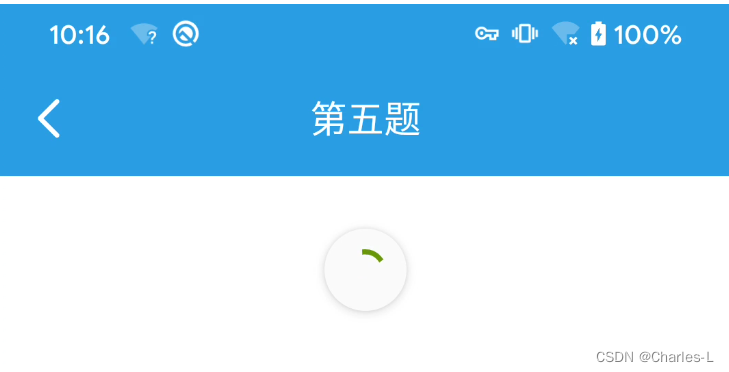
那么接下来,我们就得走Server校验Client的路子了。
Server校验Client是怎么个流程呢,总结一下就是,拿到证书文件,然后代理工具(中间人)携带证书文件去访问Server,让Server误以为是Client传来的请求。
四、验证
这里分两种方法拿到证书和证书密码:
第一种方法:
使用猿人学课程珍藏的tracer-keystore.js(用来吐证书密码的)
/*
Android keystore hooks + utilities
All instances of keystore are captured by hooking any getInstance() calls.
You can find them in keystoreList variable.
Utilities:
KeystoreListAllAliases()
ListAliasesStatic()
* List all aliases in keystores of known hardcoded types(in keystoreTypes)
KeystoreListAllAliasesOnAllInstances()
ListAliasesRuntime()
* List all aliases in keystores of all instances obtained during app runtime.
* Instances that will be dumped are collected via hijacking
* Keystore.getInstance() -> hookKeystoreGetInstance()
ListAliasesAndroid()
* List all aliases in AndroidKeyStore.
ListAliasesType(String type)
* List all aliases in a keystore of given 'type'.
* Example: ListAliasesType('AndroidKeyStore');
ListAliasesObj(Object obj)
* List all aliases for a given keystore object.
* Example: ListAliasesObj(keystoreObj);
GetKeyStore(String name)
* Retrieve keystore instance from keystoreList.
* Example: GetKeyStore("KeyStore...@af102a");
AliasInfo(String alias)
* List keystore key properties in a JSON object.
* Example: AliasInfo('secret');
*/
Java.perform(function () {
hookKeystoreGetInstance();
hookKeystoreGetInstance_Provider();
hookKeystoreGetInstance_Provider2();
hookKeystoreConstructor();
hookKeystoreLoad(false);
hookKeystoreLoadStream(false);
hookKeystoreGetKey();
hookKeystoreSetKeyEntry();
//hookKeystoreGetCertificate();
hookKeystoreGetCertificateChain();
hookKeystoreGetEntry();
hookKeystoreSetEntry();
hookKeystoreSetKeyEntry();
hookKeystoreSetKeyEntry2();
hookKeystoreStore();
hookKeystoreStoreStream()
});
console.log("KeyStore hooks loaded!");
var keystoreList = [];
var StringCls = null;
Java.perform(function () {
StringCls = Java.use('java.lang.String');
});
function hookKeystoreConstructor() {
var keyStoreConstructor = Java.use('java.security.KeyStore').$init.overload("java.security.KeyStoreSpi", "java.security.Provider", "java.lang.String");
keyStoreConstructor.implementation = function (keyStoreSpi, provider, type) {
//console.log("[Call] Keystore(java.security.KeyStoreSpi, java.security.Provider, java.lang.String )")
console.log("[Keystore()]: KeyStoreSpi: " + keyStoreSpi + ", Provider: " + provider + ", type: " + type);
return this.$init(keyStoreSpi, provider, type);
}
}
function hookKeystoreGetInstance() {
var keyStoreGetInstance = Java.use('java.security.KeyStore')['getInstance'].overload("java.lang.String");
keyStoreGetInstance.implementation = function (type) {
//console.log("[Call] Keystore.getInstance(java.lang.String )")
console.log("[Keystore.getInstance()]: type: " + type);
var tmp = this.getInstance(type);
keystoreList.push(tmp); // Collect keystore objects to allow dump them later using ListAliasesRuntime()
return tmp;
}
}
function hookKeystoreGetInstance_Provider() {
var keyStoreGetInstance = Java.use('java.security.KeyStore')['getInstance'].overload("java.lang.String", "java.lang.String");
keyStoreGetInstance.implementation = function (type, provider) {
//console.log("[Call] Keystore.getInstance(java.lang.String, java.lang.String )")
console.log("[Keystore.getInstance2()]: type: " + type + ", provider: " + provider);
var tmp = this.getInstance(type, proivder);
keystoreList.push(tmp); // Collect keystore objects to allow dump them later using ListAliasesRuntime()
return tmp;
}
}
function hookKeystoreGetInstance_Provider2() {
var keyStoreGetInstance = Java.use('java.security.KeyStore')['getInstance'].overload("java.lang.String", "java.security.Provider");
keyStoreGetInstance.implementation = function (type, provider) {
//console.log("[Call] Keystore.getInstance(java.lang.String, java.security.Provider )")
console.log("[Keystore.getInstance2()]: type: " + type + ", provider: " + provider);
var tmp = this.getInstance(type, proivder);
keystoreList.push(tmp); // Collect keystore objects to allow dump them later using ListAliasesRuntime()
return tmp;
}
}
/*
* Hook Keystore.load( ... ), set dump to true if you want to perform dump of available Aliases automatically.
*/
function hookKeystoreLoad(dump) {
var keyStoreLoad = Java.use('java.security.KeyStore')['load'].overload('java.security.KeyStore$LoadStoreParameter');
/* following function hooks to a Keystore.load(java.security.KeyStore.LoadStoreParameter) */
keyStoreLoad.implementation = function (param) {
//console.log("[Call] Keystore.load(java.security.KeyStore.LoadStoreParameter)")
console.log("[Keystore.load(LoadStoreParameter)]: keystoreType: " + this.getType() + ", param: " + param);
this.load(param);
if (dump) console.log(" Keystore loaded aliases: " + ListAliasesObj(this));
}
}
/*
* Hook Keystore.load( ... ), set dump to true if you want to perform dump of available Aliases automatically.
*/
function hookKeystoreLoadStream(dump) {
var keyStoreLoadStream = Java.use('java.security.KeyStore')['load'].overload('java.io.InputStream', '[C');
/* following function hooks to a Keystore.load(InputStream stream, char[] password) */
keyStoreLoadStream.implementation = function (stream, charArray) {
//console.log("[Call] Keystore.load(InputStream stream, char[] password)")
//var hexString = readStreamToHex (stream);
console.log("[Keystore.load(InputStream, char[])]: keystoreType: " + this.getType() + ", password: '" + charArrayToString(charArray) + "', inputSteam: " + stream);
this.load(stream, charArray);
if (dump) console.log(" Keystore loaded aliases: " + ListAliasesObj(this));
}
}
function hookKeystoreStore() {
var keyStoreStoreStream = Java.use('java.security.KeyStore')['store'].overload('java.security.KeyStore$LoadStoreParameter');
/* following function hooks to a Keystore.store(java.security.KeyStore$LoadStoreParameter) */
keyStoreStoreStream.implementation = function (param) {
console.log("[Keystore.store()]: keystoreType: " + this.getType() + ", param: '" + param);
this.store(stream, charArray);
}
}
function hookKeystoreStoreStream() {
var keyStoreStoreStream = Java.use('java.security.KeyStore')['store'].overload('java.io.OutputStream', '[C');
/* following function hooks to a Keystore.store(OutputStream stream, char[] password) */
keyStoreStoreStream.implementation = function (stream, charArray) {
console.log("[Keystore.store(OutputStream, char[])]: keystoreType: " + this.getType() + ", password: '" + charArrayToString(charArray) + "', outputSteam: " + stream);
this.store(stream, charArray);
}
}
function hookKeystoreGetKey() {
var keyStoreGetKey = Java.use('java.security.KeyStore')['getKey'].overload("java.lang.String", "[C");
keyStoreGetKey.implementation = function (alias, charArray) {
//console.log("[Call] Keystore.getKey(java.lang.String, [C )")
console.log("[Keystore.getKey()]: alias: " + alias + ", password: '" + charArrayToString(charArray) + "'");
return this.getKey(alias, charArray);
}
}
function hookKeystoreSetEntry() {
var keyStoreSetKeyEntry = Java.use('java.security.KeyStore')['setEntry'].overload("java.lang.String", "java.security.KeyStore$Entry", "java.security.KeyStore$ProtectionParameter");
keyStoreSetKeyEntry.implementation = function (alias, entry, protection) {
//console.log("[Call] Keystore.setEntry(java.lang.String, java.security.KeyStore$Entry, java.security.KeyStore$ProtectionParameter )")
console.log("[Keystore.setEntry()]: alias: " + alias + ", entry: " + dumpKeyStoreEntry(entry) + "', protection: " + dumpProtectionParameter(protection));
return this.setEntry(alias, entry, protection);
}
}
function hookKeystoreSetKeyEntry() {
var keyStoreSetKeyEntry = Java.use('java.security.KeyStore')['setKeyEntry'].overload("java.lang.String", "java.security.Key", "[C", "[Ljava.security.cert.Certificate;");
keyStoreSetKeyEntry.implementation = function (alias, key, charArray, certs) {
//console.log("[Call] Keystore.setKeyEntry(java.lang.String, java.security.Key, [C, [Ljava.security.cert.Certificate; )
console.log("[Keystore.setKeyEntry()]: alias: " + alias + ", key: " + key + ", password: '" + charArrayToString(charArray) + "', certs: " + certs);
return this.setKeyEntry(alias, key, charArray, certs);
}
}
function hookKeystoreSetKeyEntry2() {
var keyStoreSetKeyEntry = Java.use('java.security.KeyStore')['setKeyEntry'].overload("java.lang.String", "[B", "[Ljava.security.cert.Certificate;");
keyStoreSetKeyEntry.implementation = function (alias, key, certs) {
//console.log("[Call] Keystore.setKeyEntry(java.lang.String, [B, [Ljava.security.cert.Certificate; )")
console.log("[Keystore.setKeyEntry2()]: alias: " + alias + ", key: " + key + "', certs: " + certs);
return this.setKeyEntry(alias, key, certs);
}
}
/*
* Usually used to load certs for cert pinning.
*/
function hookKeystoreGetCertificate() {
var keyStoreGetCertificate = Java.use('java.security.KeyStore')['getCertificate'].overload("java.lang.String");
keyStoreGetCertificate.implementation = function (alias) {
//console.log("[Call] Keystore.getCertificate(java.lang.String )")
console.log("[Keystore.getCertificate()]: alias: " + alias);
return this.getCertificate(alias);
}
}
/*
* Usually used to load certs for cert pinning.
*/
function hookKeystoreGetCertificateChain() {
var keyStoreGetCertificate = Java.use('java.security.KeyStore')['getCertificateChain'].overload("java.lang.String");
keyStoreGetCertificate.implementation = function (alias) {
//console.log("[Call] Keystore.getCertificateChain(java.lang.String )")
console.log("[Keystore.getCertificateChain()]: alias: " + alias);
return this.getCertificateChain(alias);
}
}
function hookKeystoreGetEntry() {
var keyStoreGetEntry = Java.use('java.security.KeyStore')['getEntry'].overload("java.lang.String", "java.security.KeyStore$ProtectionParameter");
keyStoreGetEntry.implementation = function (alias, protection) {
//console.log("[Call] Keystore.getEntry(java.lang.String, java.security.KeyStore$ProtectionParameter )")
console.log("[Keystore.getEntry()]: alias: " + alias + ", protection: '" + dumpProtectionParameter(protection) + "'");
var entry = this.getEntry(alias, protection);
console.log("[getEntry()]: Entry: " + dumpKeyStoreEntry(entry));
return entry;
}
}
function dumpProtectionParameter(protection) {
if (protection != null) {
// android.security.keystore.KeyProtection, java.security.KeyStore.CallbackHandlerProtection, java.security.KeyStore.PasswordProtection, android.security.KeyStoreParameter
var protectionCls = protection.$className;
if (protectionCls.localeCompare("android.security.keystore.KeyProtection") == 0) {
return "" + protectionCls + " [implement dumping if needed]";
}
else if (protectionCls.localeCompare("java.security.KeyStore.CallbackHandlerProtection") == 0) {
return "" + protectionCls + " [implement dumping if needed]";
}
else if (protectionCls.localeCompare("java.security.KeyStore.PasswordProtection") == 0) {
getPasswordMethod = Java.use('java.security.KeyStore.PasswordProtection')['getPassword'];
password = getPasswordMethod.call(protection);
return "password: " + charArrayToString(password);
}
else if (protectionCls.localeCompare("android.security.KeyStoreParameter") == 0) {
isEncryptionRequiredMethod = Java.use('android.security.KeyStoreParameter')['isEncryptionRequired'];
result = isEncryptionRequiredMethod.call(protection);
return "isEncryptionRequired: " + result;
}
else
return "Unknown protection parameter type: " + protectionCls;
}
else
return "null";
}
function dumpKeyStoreEntry(entry) {
// java.security.KeyStore$PrivateKeyEntry, java.security.KeyStore$SecretKeyEntry, java.security.KeyStore$TrustedCertificateEntry, android.security.WrappedKeyEntry
if (entry != null) {
var entryCls = entry.$className;
var castedEntry = Java.cast(entry, Java.use(entryCls));
if (entryCls.localeCompare("java.security.KeyStore$PrivateKeyEntry") == 0) {
var getPrivateKeyEntryMethod = Java.use('java.security.KeyStore$PrivateKeyEntry')['getPrivateKey'];
var key = getPrivateKeyEntryMethod.call(castedEntry);
return "" + entryCls + " [implement key dumping if needed] " + key.$className;
}
else if (entryCls.localeCompare("java.security.KeyStore$SecretKeyEntry") == 0) {
var getSecretKeyMethod = Java.use('java.security.KeyStore$SecretKeyEntry')['getSecretKey'];
var key = getSecretKeyMethod.call(castedEntry);
var keyGetFormatMethod = Java.use(key.$className)['getFormat'];
var keyGetEncodedMethod = Java.use(key.$className)['getEncoded'];
//console.log(""+key.$className);
if (key.$className.localeCompare("android.security.keystore.AndroidKeyStoreSecretKey") == 0)
return "keyClass: android.security.keystore.AndroidKeyStoreSecretKey can't dump";
return "keyFormat: " + keyGetFormatMethod.call(key) + ", encodedKey: '" + keyGetEncodedMethod.call(key) + "', key: " + key;
}
else if (entryCls.localeCompare("java.security.KeyStore$TrustedCertificateEntry") == 0) {
return "" + entryCls + " [implement key dumping if needed]";
}
else if (entryCls.localeCompare("android.security.WrappedKeyEntry") == 0) {
return "" + entryCls + " [implement key dumping if needed]";
}
else
return "Unknown key entry type: " + entryCls;
}
else
return "null";
}
/*
* Dump all aliasses in keystores of all types(predefined in keystoreTypes)
*/
function ListAliasesStatic() {
// BCPKCS12/PKCS12-DEF - exceptions
var keystoreTypes = ["AndroidKeyStore", "AndroidCAStore", /*"BCPKCS12",*/ "BKS", "BouncyCastle", "PKCS12", /*"PKCS12-DEF"*/];
keystoreTypes.forEach(function (entry) {
console.log("[ListAliasesStatic] keystoreType: " + entry + " \nAliases: " + ListAliasesType(entry));
});
return "[done]";
}
/*
* Dump all aliasses in keystores of all instances obtained during app runtime.
* Instances that will be dumped are collected via hijacking Keystre.getInstance() -> hookKeystoreGetInstance()
*/
function ListAliasesRuntime() {
Java.perform(function () {
console.log("[ListAliasesRuntime] Instances: " + keystoreList);
keystoreList.forEach(function (entry) {
console.log("[ListAliasesRuntime] keystoreObj: " + entry + " type: " + entry.getType() + " \n" + ListAliasesObj(entry));
});
});
return "[done]";
}
/*
* Dump all aliasses in AndroidKey keystore.
*/
function ListAliasesAndroid() {
return ListAliasesType("AndroidKeyStore");
}
/*
* Dump all aliasses in keystore of given 'type'.
* Example: ListAliasesType('AndroidKeyStore');
*/
function ListAliasesType(type) {
var result = [];
Java.perform(function () {
var keyStoreCls = Java.use('java.security.KeyStore');
var keyStoreObj = keyStoreCls.getInstance(type);
keyStoreObj.load(null);
var aliases = keyStoreObj.aliases();
//console.log("aliases: " + aliases.getClass());
while (aliases.hasMoreElements()) {
result.push("'" + aliases.nextElement() + "'");
}
});
return result;
}
/*
* Dump all aliasses for a given keystore object.
* Example: ListAliasesObj(keystoreObj);
*/
function ListAliasesObj(obj) {
var result = [];
Java.perform(function () {
var aliases = obj.aliases();
while (aliases.hasMoreElements()) {
result.push(aliases.nextElement() + "");
}
});
return result;
}
/*
* Retrieve keystore instance from keystoreList
* Example: GetKeyStore("KeyStore...@af102a");
*/
function GetKeyStore(keystoreName) {
var result = null;
Java.perform(function () {
for (var i = 0; i < keystoreList.length; i++) {
if (keystoreName.localeCompare("" + keystoreList[i]) == 0)
result = keystoreList[i];
}
});
return result;
}
/*
* Dump keystore key properties in JSON object
* Example: AliasInfo('secret');
*/
function AliasInfo(keyAlias) {
var result = {};
Java.perform(function () {
var keyStoreCls = Java.use('java.security.KeyStore');
var keyFactoryCls = Java.use('java.security.KeyFactory');
var keyInfoCls = Java.use('android.security.keystore.KeyInfo');
var keySecretKeyFactoryCls = Java.use('javax.crypto.SecretKeyFactory');
var keyFactoryObj = null;
var keyStoreObj = keyStoreCls.getInstance('AndroidKeyStore');
keyStoreObj.load(null);
var key = keyStoreObj.getKey(keyAlias, null);
if (key == null) {
console.log('key does not exist');
return null;
}
try {
keyFactoryObj = keyFactoryCls.getInstance(key.getAlgorithm(), 'AndroidKeyStore');
} catch (err) {
keyFactoryObj = keySecretKeyFactoryCls.getInstance(key.getAlgorithm(), 'AndroidKeyStore');
}
var keyInfo = keyFactoryObj.getKeySpec(key, keyInfoCls.class);
result.keyAlgorithm = key.getAlgorithm();
result.keySize = keyInfoCls['getKeySize'].call(keyInfo);
result.blockModes = keyInfoCls['getBlockModes'].call(keyInfo);
result.digests = keyInfoCls['getDigests'].call(keyInfo);
result.encryptionPaddings = keyInfoCls['getEncryptionPaddings'].call(keyInfo);
result.keyValidityForConsumptionEnd = keyInfoCls['getKeyValidityForConsumptionEnd'].call(keyInfo);
if (result.keyValidityForConsumptionEnd != null) result.keyValidityForConsumptionEnd = result.keyValidityForConsumptionEnd.toString();
result.keyValidityForOriginationEnd = keyInfoCls['getKeyValidityForOriginationEnd'].call(keyInfo);
if (result.keyValidityForOriginationEnd != null) result.keyValidityForOriginationEnd = result.keyValidityForOriginationEnd.toString();
result.keyValidityStart = keyInfoCls['getKeyValidityStart'].call(keyInfo);
if (result.keyValidityStart != null) result.keyValidityStart = result.keyValidityStart.toString();
result.keystoreAlias = keyInfoCls['getKeystoreAlias'].call(keyInfo);
result.origin = keyInfoCls['getOrigin'].call(keyInfo);
result.purposes = keyInfoCls['getPurposes'].call(keyInfo);
result.signaturePaddings = keyInfoCls['getSignaturePaddings'].call(keyInfo);
result.userAuthenticationValidityDurationSeconds = keyInfoCls['getUserAuthenticationValidityDurationSeconds'].call(keyInfo);
result.isInsideSecureHardware = keyInfoCls['isInsideSecureHardware'].call(keyInfo);
result.isInvalidatedByBiometricEnrollment = keyInfoCls['isInvalidatedByBiometricEnrollment'].call(keyInfo);
try { result.isTrustedUserPresenceRequired = keyInfoCls['isTrustedUserPresenceRequired'].call(keyInfo); } catch (err) { }
result.isUserAuthenticationRequired = keyInfoCls['isUserAuthenticationRequired'].call(keyInfo);
result.isUserAuthenticationRequirementEnforcedBySecureHardware = keyInfoCls['isUserAuthenticationRequirementEnforcedBySecureHardware'].call(keyInfo);
result.isUserAuthenticationValidWhileOnBody = keyInfoCls['isUserAuthenticationValidWhileOnBody'].call(keyInfo);
try { result.isUserConfirmationRequired = keyInfoCls['isUserConfirmationRequired'].call(keyInfo); } catch (err) { }
//console.log(" result: " + JSON.stringify(result));
//console.log("aliases: " + aliases.getClass());
});
return result;
}
/* following function reads an InputStream and returns an ASCII char representation of it */
function readStreamToHex(stream) {
var data = [];
var byteRead = stream.read();
while (byteRead != -1) {
data.push(('0' + (byteRead & 0xFF).toString(16)).slice(-2));
/* <---------------- binary to hex ---------------> */
byteRead = stream.read();
}
stream.close();
return data.join('');
}
function charArrayToString(charArray) {
if (charArray == null)
return '(null)';
else
return StringCls.$new(charArray);
}
启动效果
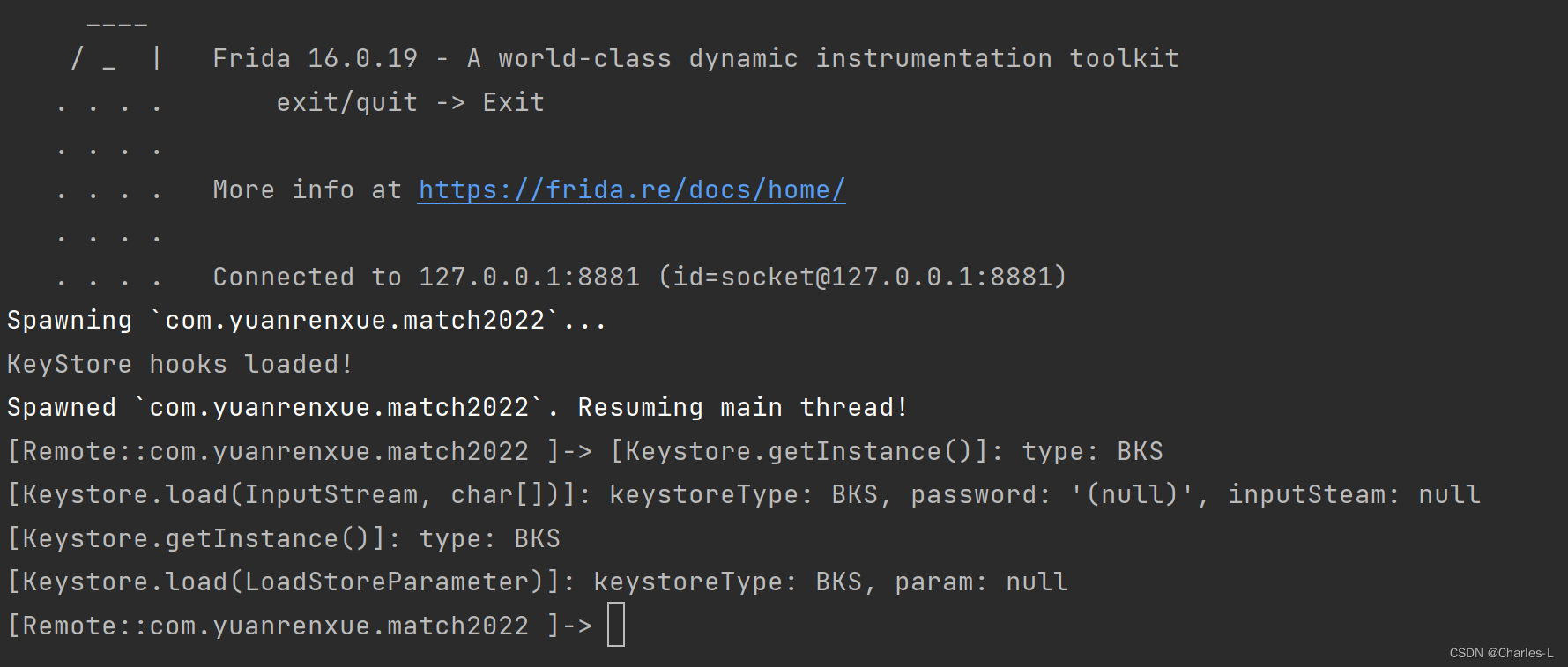
然后手机点击第五题,可以发现证书密码被吐了出来

拿到证书密码后,就可以直接快乐的去找证书文件了,直接先拖到jadx去反编译看看,证书一般是在资源文件的assets里面的,根据上面的截图,可以知道证书密码就是这个BKS文件的密码。在这里我们就需要把这个证书文件给取出来,然后转换成.p12格式的证书,提供给Charles抓包。
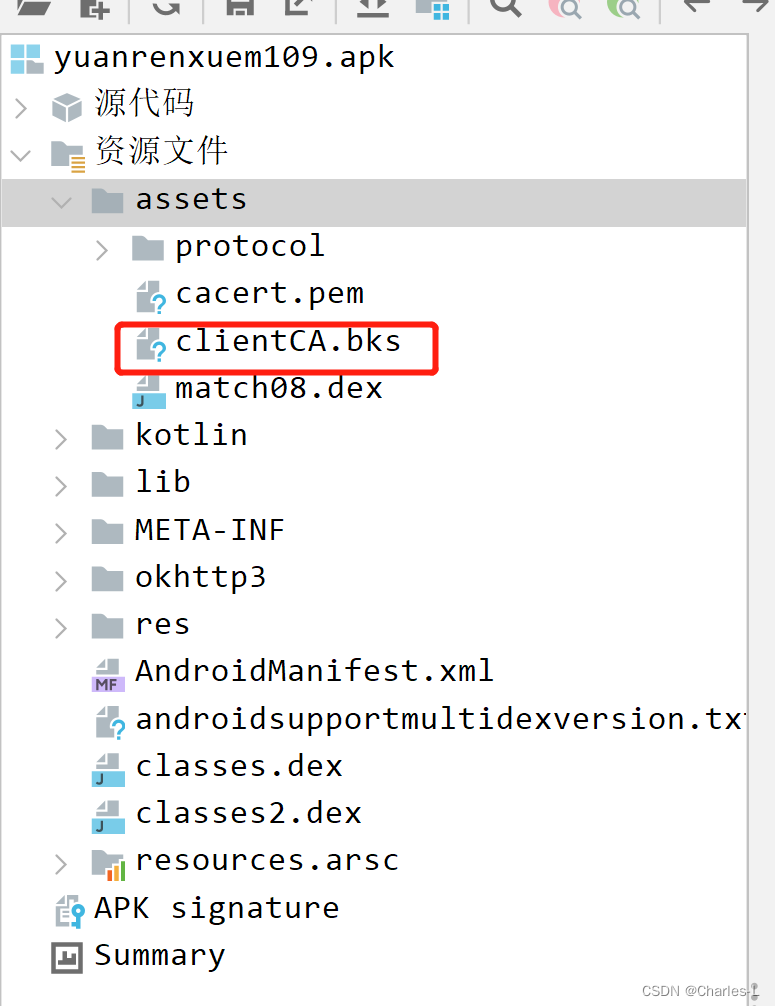
那怎么拿出来呢,可以直接使用解压这个功能,然后找到对应的文件,拿出来就可以了。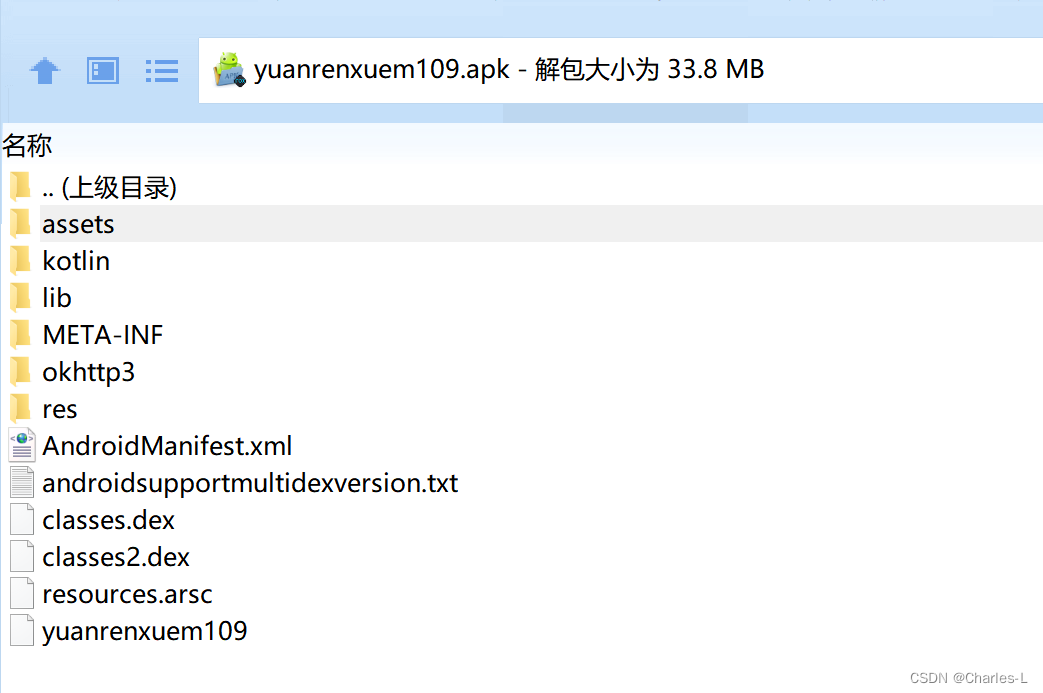
这个证书拿出来后,要怎么才能变成.p12格式呢,这里我使用的是keystore-explorer,进行bks到p12的转换(但是这个工具最新版是打不开这个证书文件的)所以我们要回退到旧版本,去安装使用。
找到v5.5.1版本,按照自己的系统和需求去下载。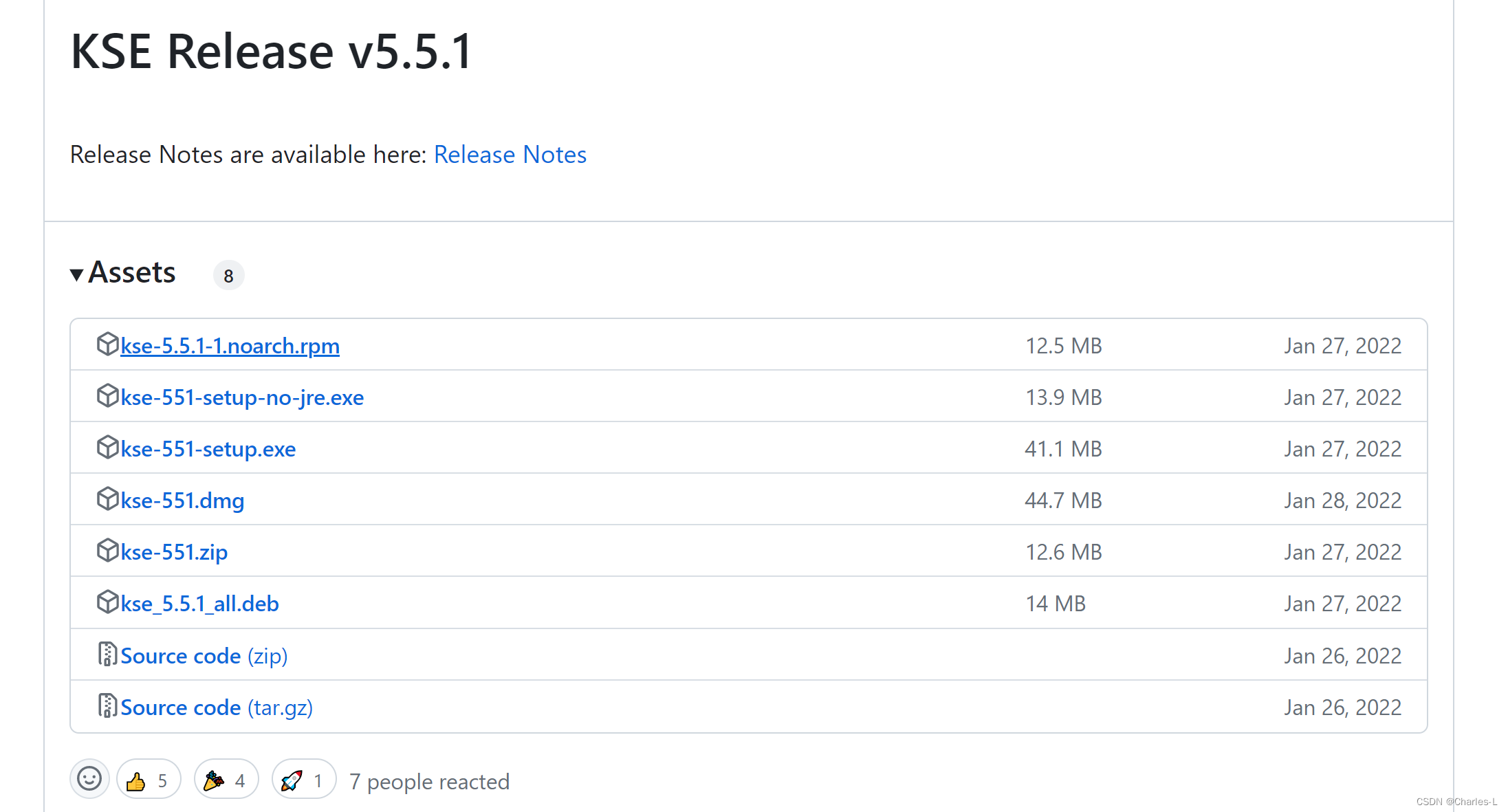
安装好了之后,把BKS证书文件拖进去,密码就是我们上面frida吐出来的密码—MZ4cozY8Qu32UzGe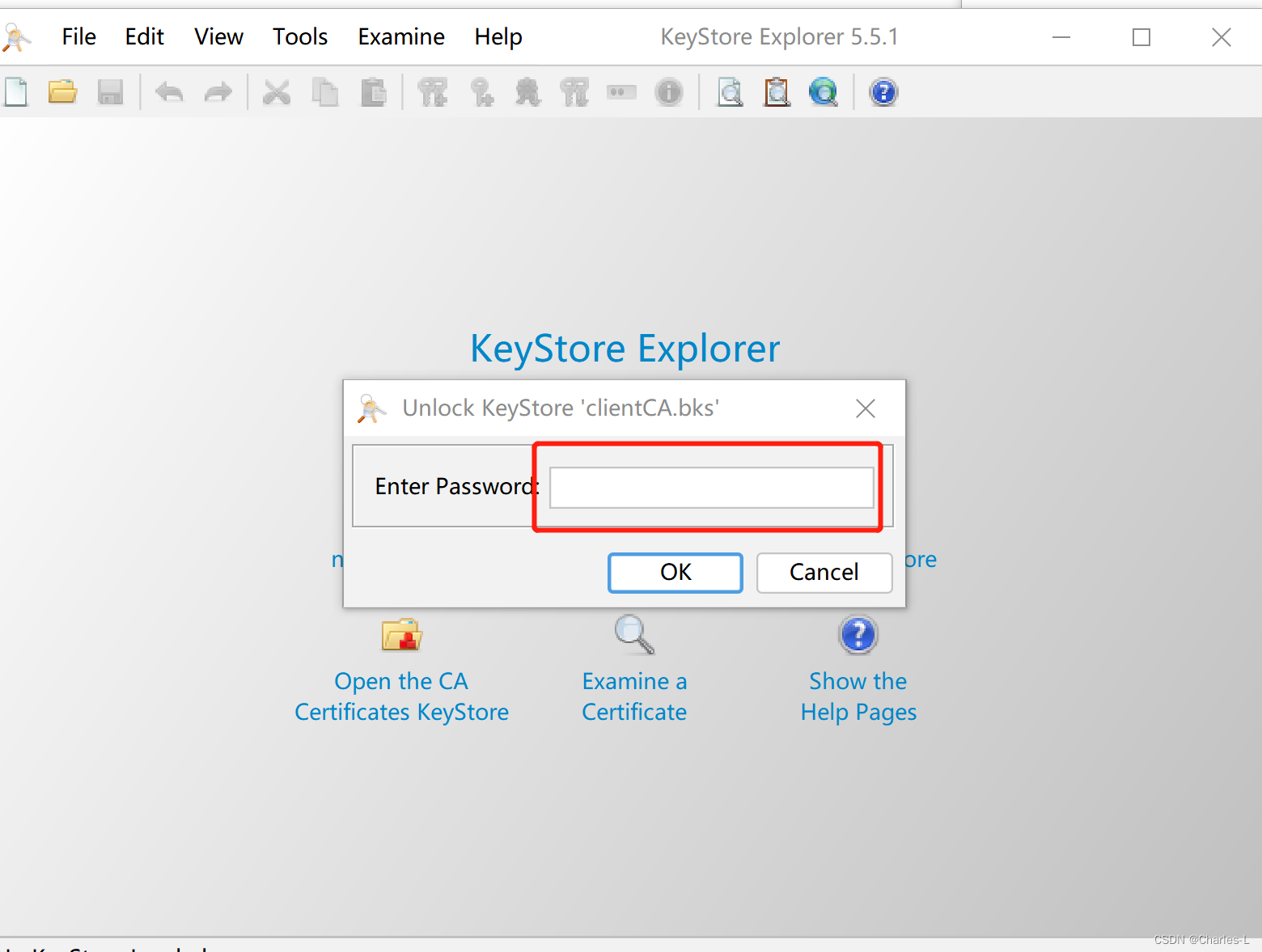
然后点击Tools->Change KeyStore Type->PKC#12,转换后还会要求输入一次密码

然后右键选择Export导出证书。

这个就是我导出的1.p12证书

既然有了证书文件和证书密码,那就可以拿去Charles配置一下证书,让它伪装成携带证书的Client。
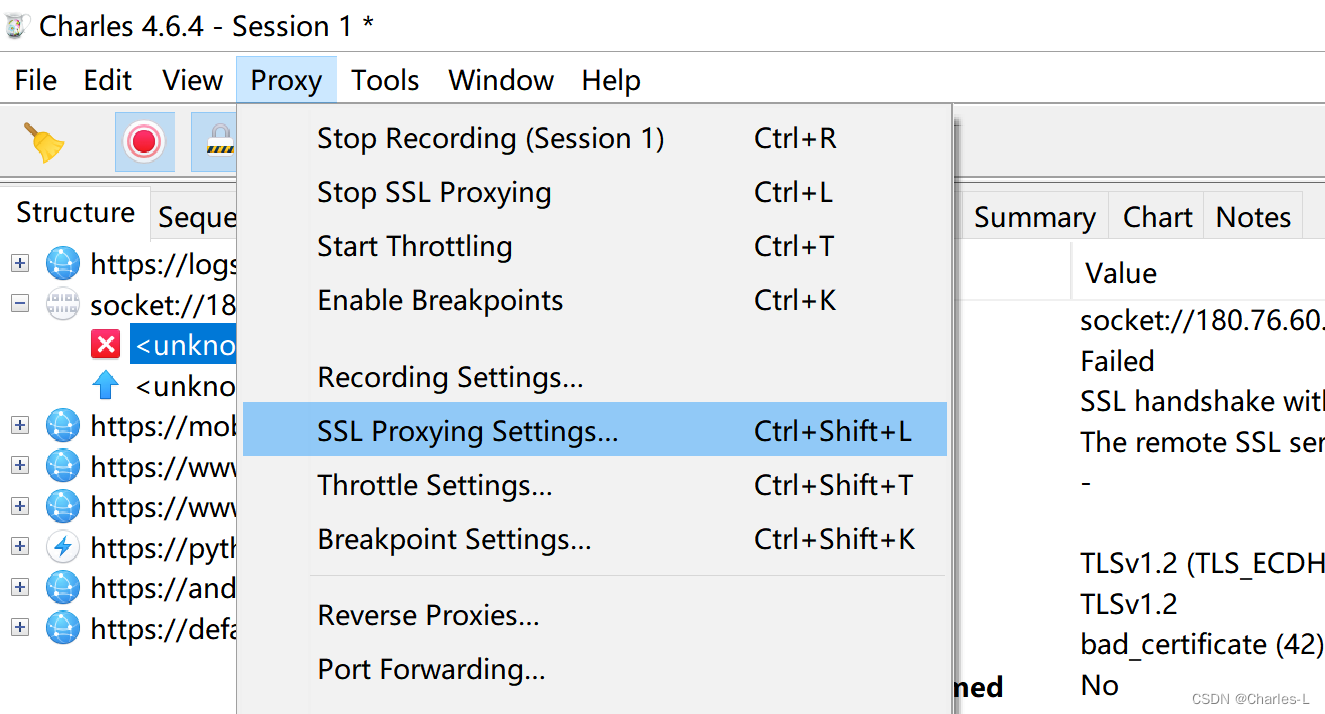
这里如果没有创建过的会要求输入一个密码,这里直接回车就行,不用去设置。
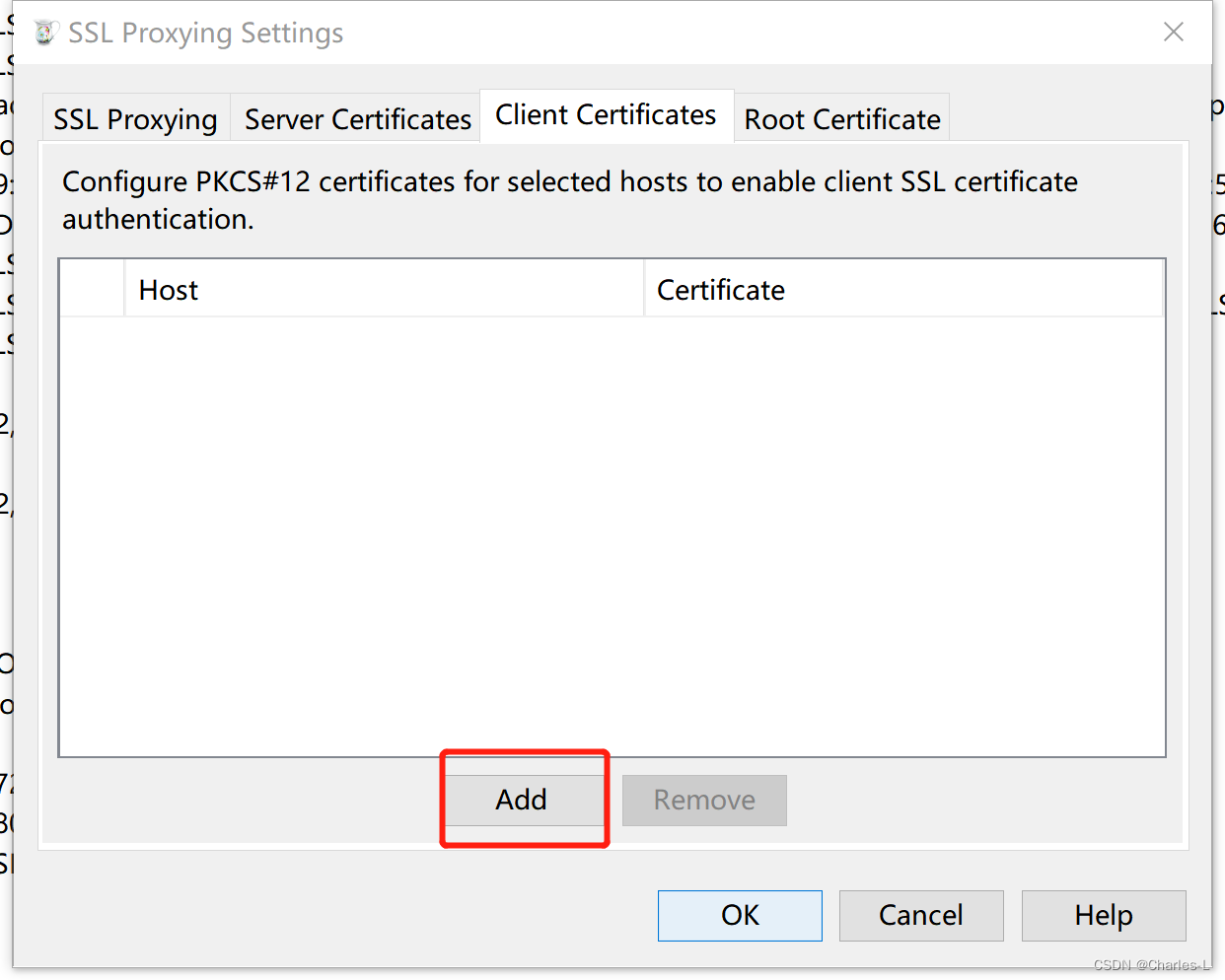
把刚刚访问失败的ip和端口填上,然后点击Import P12文件
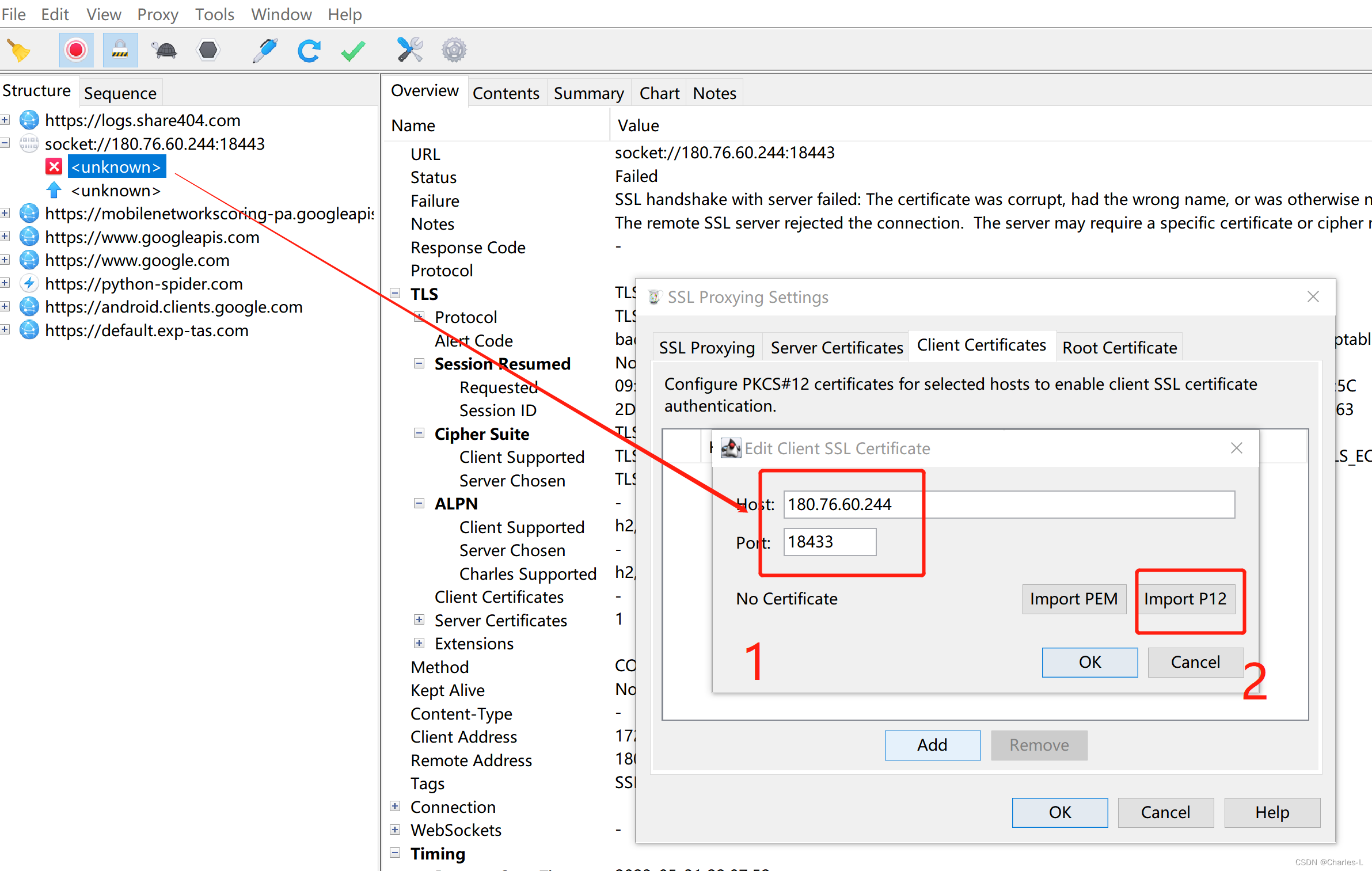
找到刚刚导出的1.p12证书文件
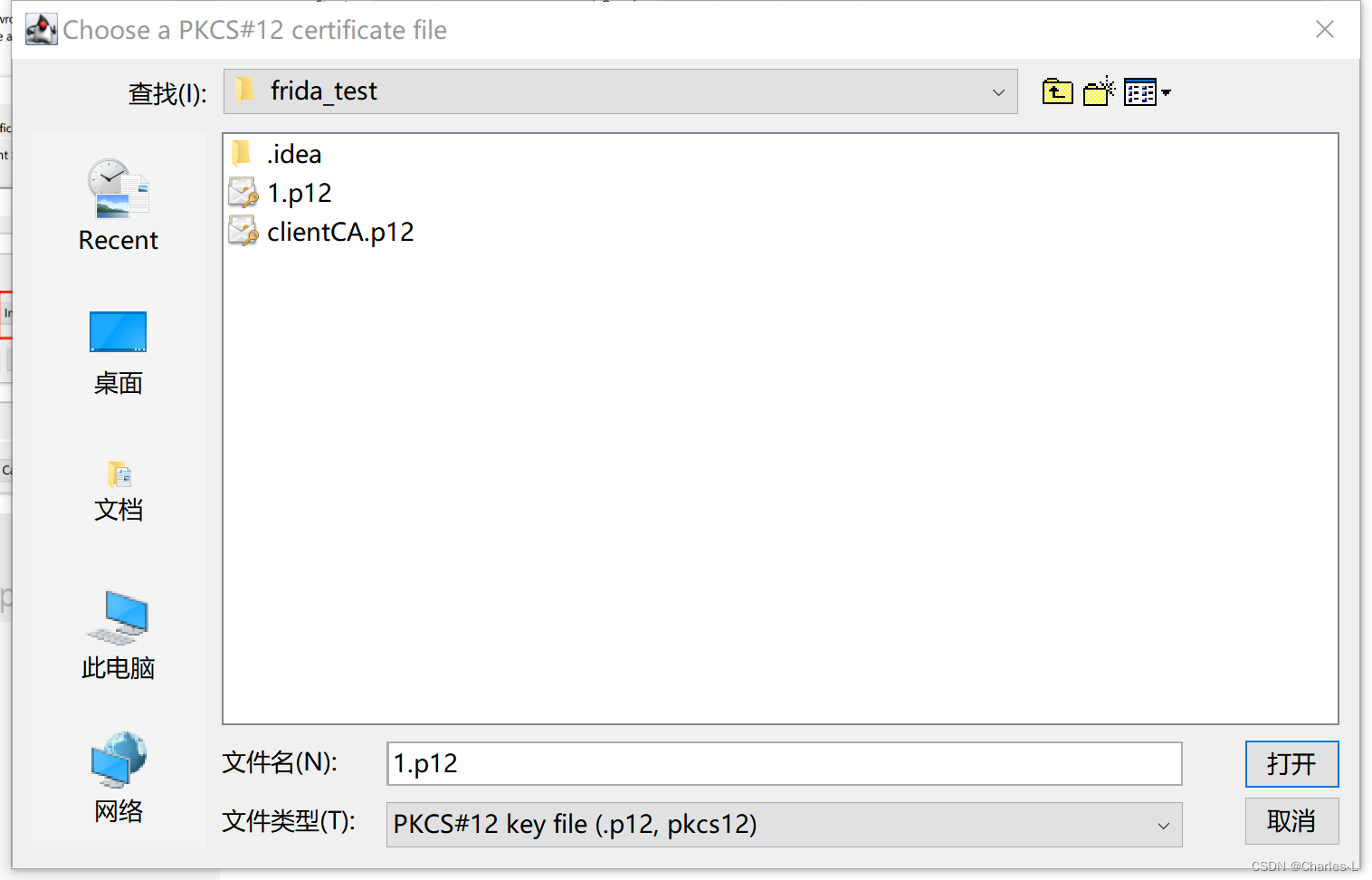
输入一下刚刚得到的证书密码—MZ4cozY8Qu32UzGe

然后一路点OK

然后我们回到SSL Proxying标签,新增加一个*:18443(刚刚抓失败的端口)
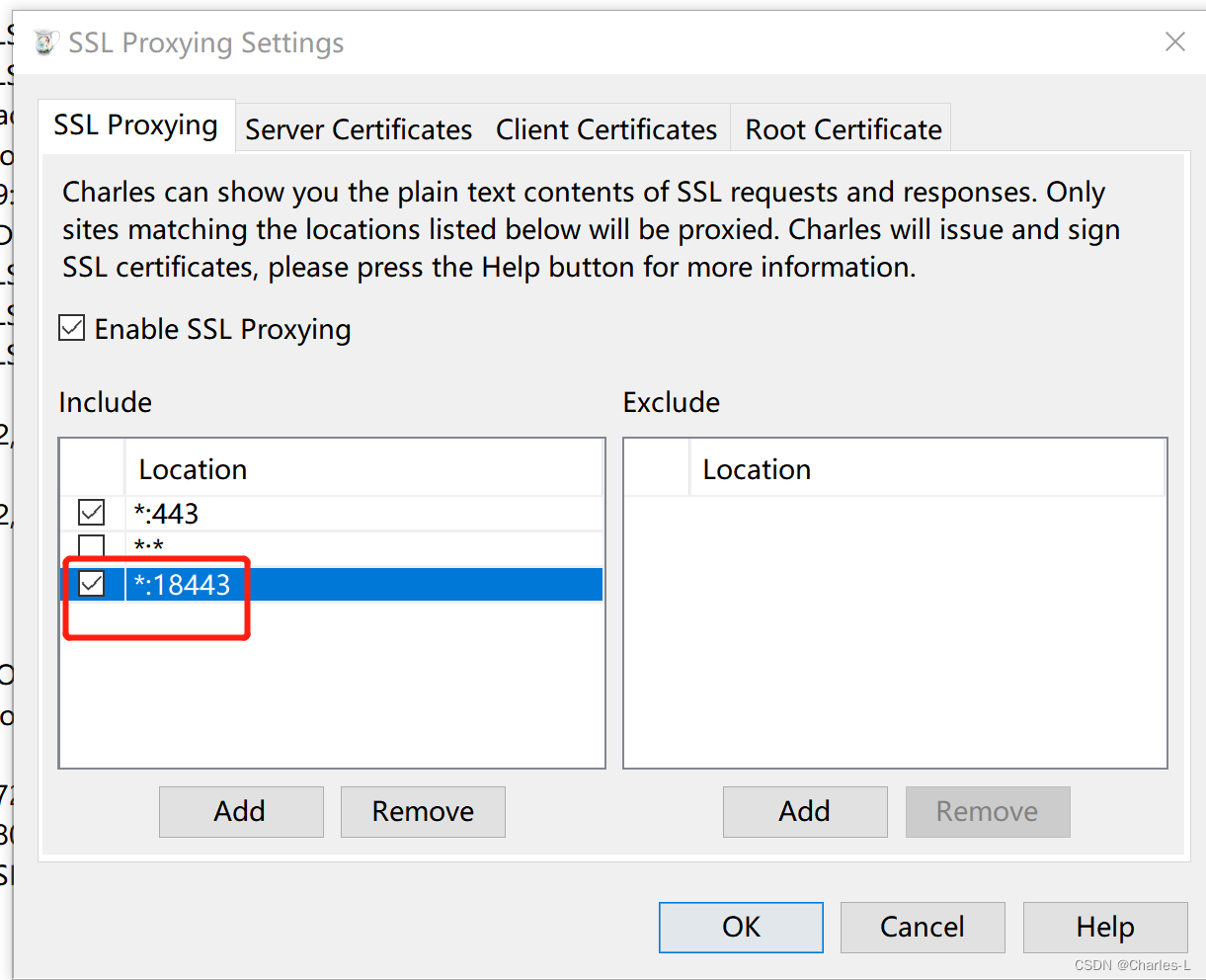
最后点一下OK,按照道理说这么干已经成功了,但是很可惜,我做到这一步还是失败了。直接告诉我证书是损坏的。这也就是我开头说的无法解决的一个小问题,希望读者如果有解决方法请告知,感激不尽。

但是这并不代表,我们的证书文件不能用了。我们直接用吾爱破解网darbra大佬写的文章的python代码来进行携带证书请求我们刚刚访问失败的网站。
先安装requests_pkcs12
pip install requests_pkcs12
import requests_pkcs12
def get_page(page):
url = 'https://180.76.60.244:18443/api/app5'
hd = {
'Content-Type':'application/x-www-form-urlencoded',
'user-agent': 'okhttp/3.14.9'
}
data = {
'page': page
}
resp = requests_pkcs12.post(url,
headers=hd, data=data, pkcs12_filename='1.p12',
pkcs12_password='MZ4cozY8Qu32UzGe', verify=False)
print(resp.json())
get_page(1)
可以看到数据出来了!

当然这个请求不是无缘无故写出来的,是可以通过r0capture抓包工具抓到分析出来的
python r0capture.py -H 127.0.0.1:8881 猿人学2022
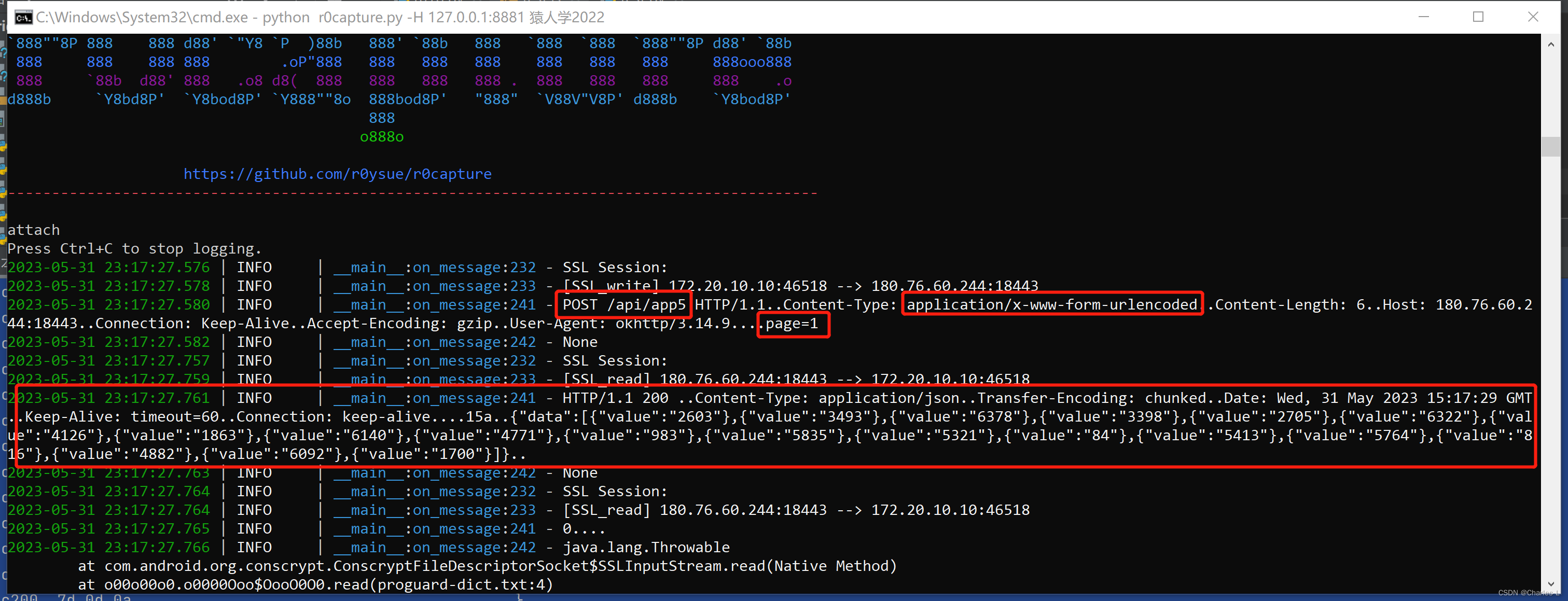
POST请求
url是…:https://180.76.60.244:18443/api/app5
Content-Type是application/x-www-form-urlencoded
User-Agent是okhttp/3.14.9
data是page=1
到此我们的第一种方法已经结束。
第二种方法:
第二种证书和密钥的获取方法,就比较简单了,使用我们刚刚说的r0capture抓包工具就可以做到自动将证书给下载保存到我们的手机的/sdcard/Download/目录下,密码是r0ysue。
启动一下r0captue。
python r0capture.py -H 127.0.0.1:8881 猿人学2022
然后启动成功后,去点击第五题,就会自动保存证书了。

剩下的步骤我们只需要用下面代码就可以把证书导出来
adb pull /sdcard/Download/证书文件.p12 ./
如果显示没有该文件就到/sdcard/Download/看看是什么情况。会发现很多大小一样的证书文件,但是名字都和上面截图不一样,不用慌,我们只需要选择其中一个,名字改一下(方便pull),我这里是改了一个为client
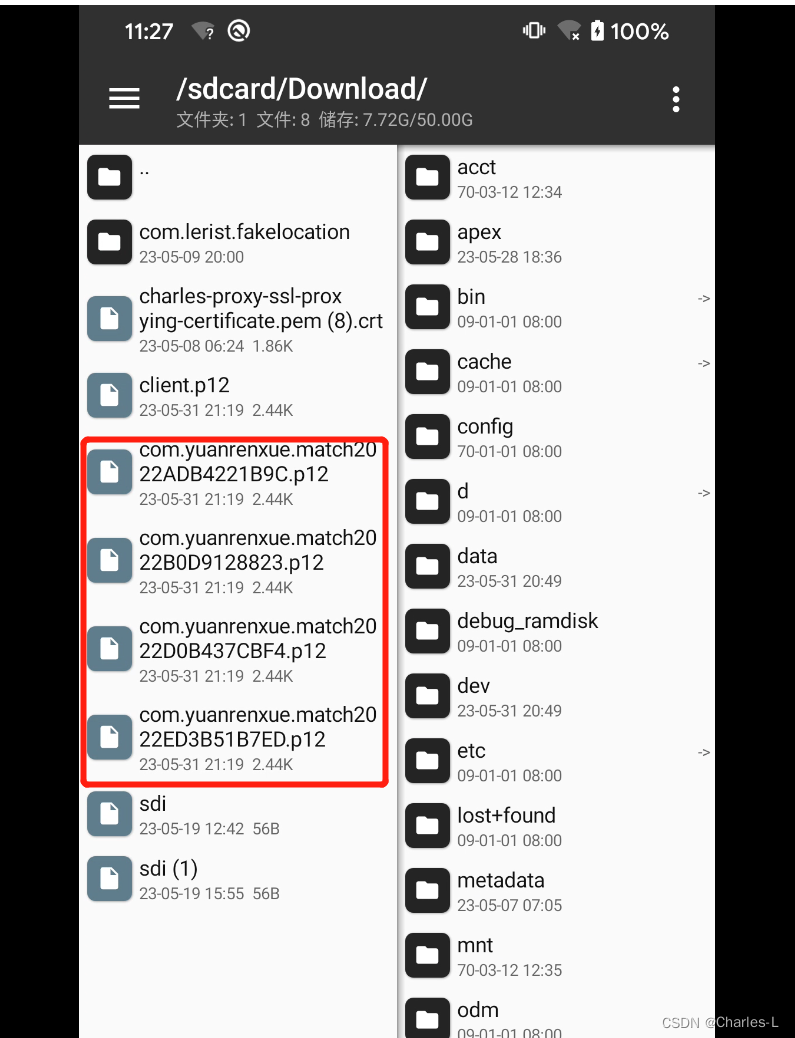
再执行adb pull语句就成功了。
然后重复第一方法的步骤,将证书导入,不过这次的证书密码就得是r0ysue了(这里就不演示怎么导入的了,除了导出证书和密码不一样,其他的都一模一样,就连python使用都一样)
import requests_pkcs12
def get_page(page):
url = 'https://180.76.60.244:18443/api/app5'
hd = {
'Content-Type':'application/x-www-form-urlencoded',
'user-agent': 'okhttp/3.14.9'
}
data = {
'page': page
}
resp = requests_pkcs12.post(url,
headers=hd, data=data, pkcs12_filename='client.p12',
pkcs12_password='r0ysue', verify=False)
print(resp.json())
get_page(1)
可以看到结果都是一样的

借鉴
猿人学比赛第五题-双向认证分享
猿人学
